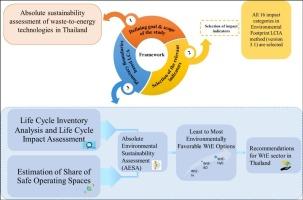基于地球边界的泰国可持续废物管理废物转化为能源技术评估
IF 9.6
1区 环境科学与生态学
Q1 ENVIRONMENTAL STUDIES
引用次数: 0
摘要
全球电力需求和城市固体废物(MSW)产生的快速增长提出了重大的环境挑战。垃圾发电(WtE)技术通过将城市生活垃圾转化为电力,减少对化石燃料的依赖,提供了一个很有前途的解决方案。在本研究中,通过使用基于行星边界的生命周期评估(PB-LCA)方法,对三种垃圾处理技术进行了绝对环境可持续性评估(AESA):厌氧消化(WtE- ad)、焚烧(WtE-In)和焚烧与厌氧消化混合(WtE- hyb),用于泰国的生活垃圾管理。估计安全作业空间份额的分配方法分别以国家一级的人均平等和电力部门一级的最终消费支出为基础。AESA结果表明,WtE-Hyb是考虑的选项中性能最好的,对行星边界施加的压力最小。气候变化是最严重的影响类别,WtE-AD, WtE-In和WtE-Hyb每吨处理用于发电的生活垃圾分别排放520千克CO₂当量,391千克CO₂当量和280千克CO₂当量。这三种WtE方案的排放量分别超出了估计允许限值的8700%、8400%和3100%。除了淡水富营养化外,WtE-Hyb在其中5个边界中施加的压力最低,在淡水富营养化中施加的压力第二高。相比之下,WtE-In违反的边界最多(总共10个),在所有类别中施加的压力最大。基于pb - lca的AESA结果提出的政策建议建议采取更严格的排放控制、财政激励和公众参与,以实现泰国的可持续废物管理。本文章由计算机程序翻译,如有差异,请以英文原文为准。

A planetary boundaries-based assessment of waste-to-energy technologies for sustainable waste management in Thailand
The rapid increase in global electricity demand and municipal solid waste (MSW) generation presents significant environmental challenges. Waste-to-Energy (WtE) technologies provide a promising solution by converting MSW into electricity, reducing reliance on fossil fuels. In this study, an absolute environmental sustainability assessment (AESA) is performed by using a Planetary Boundaries-based Life Cycle Assessment (PB-LCA) approach for three WtE technologies: anaerobic digestion (WtE-AD), incineration (WtE-In), and a hybrid of incineration and anaerobic digestion (WtE-Hyb), for MSW management in Thailand. Allocation methods for estimating the share of safe operating spaces were based on equal per capita at the national level and final consumption expenditure at the power sector level, respectively. Results of the AESA indicate that WtE-Hyb is the best-performing option among those considered, exerting the least pressure on planetary boundaries. Climate change was the most transgressed impact category, with WtE-AD, WtE-In, and WtE-Hyb emitting 520 kg CO₂ eq, 391 kg CO₂ eq, and 280 kg CO₂ eq, respectively, per tonne of MSW processed for electricity production. These emissions exceeded the estimated allowable limits by 8700%, 8400%, and 3100% for the three WtE options, respectively. Despite transgressing six boundaries, WtE-Hyb had the lowest pressure in five of them, except for freshwater eutrophication, where it exerted the second-highest pressure. In contrast, WtE-In transgressed the most boundaries (a total of 10) and exerted the highest pressure across all categories. The policy recommendations based on PB-LCA-based AESA results suggest stricter emissions controls, financial incentives, and public engagement to achieve sustainable waste management in Thailand.
求助全文
通过发布文献求助,成功后即可免费获取论文全文。
去求助
来源期刊

Sustainable Production and Consumption
Environmental Science-Environmental Engineering
CiteScore
17.40
自引率
7.40%
发文量
389
审稿时长
13 days
期刊介绍:
Sustainable production and consumption refers to the production and utilization of goods and services in a way that benefits society, is economically viable, and has minimal environmental impact throughout its entire lifespan. Our journal is dedicated to publishing top-notch interdisciplinary research and practical studies in this emerging field. We take a distinctive approach by examining the interplay between technology, consumption patterns, and policy to identify sustainable solutions for both production and consumption systems.
 求助内容:
求助内容: 应助结果提醒方式:
应助结果提醒方式:


